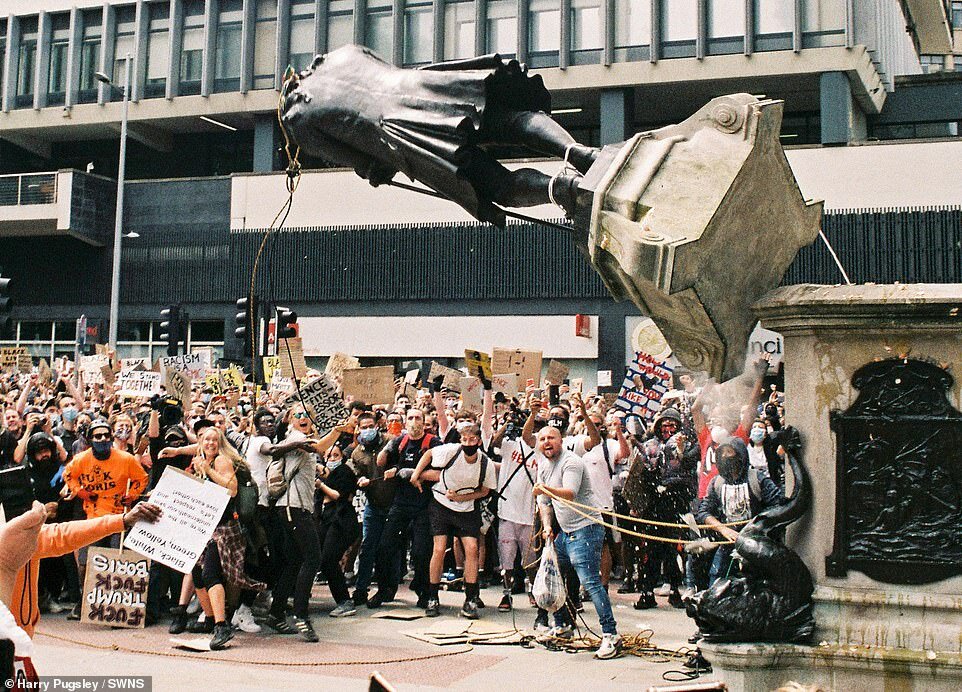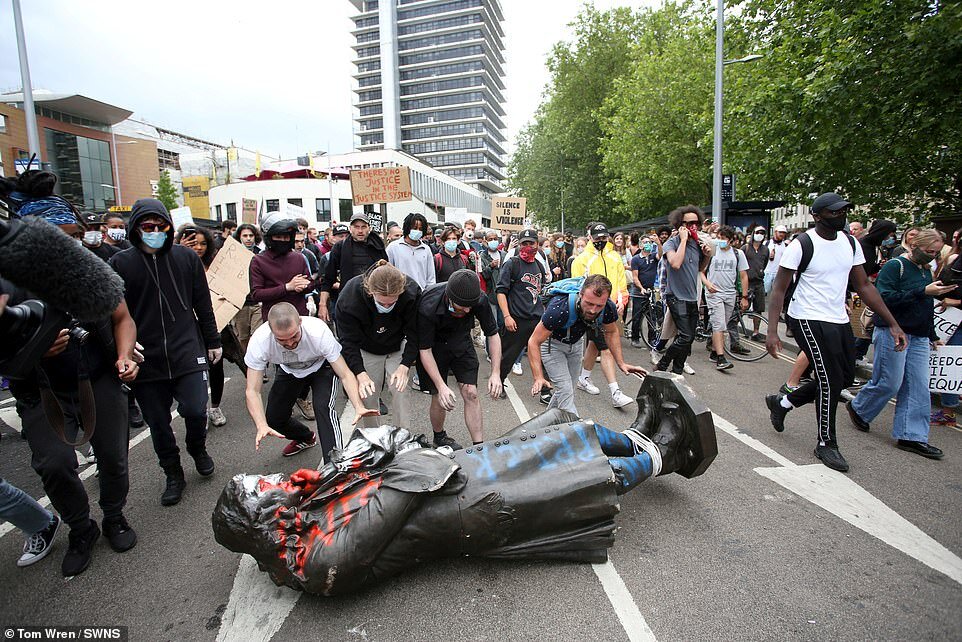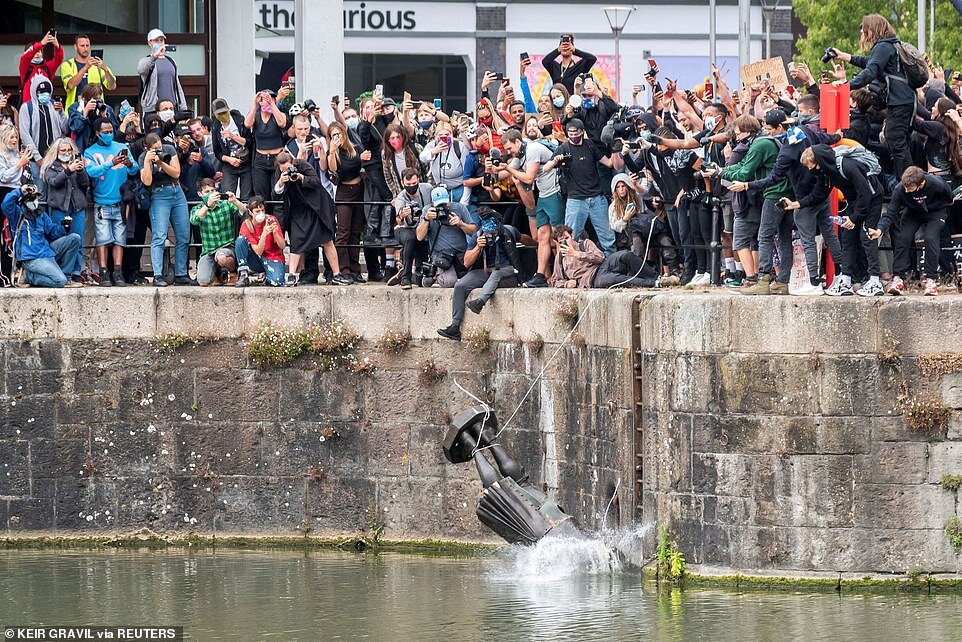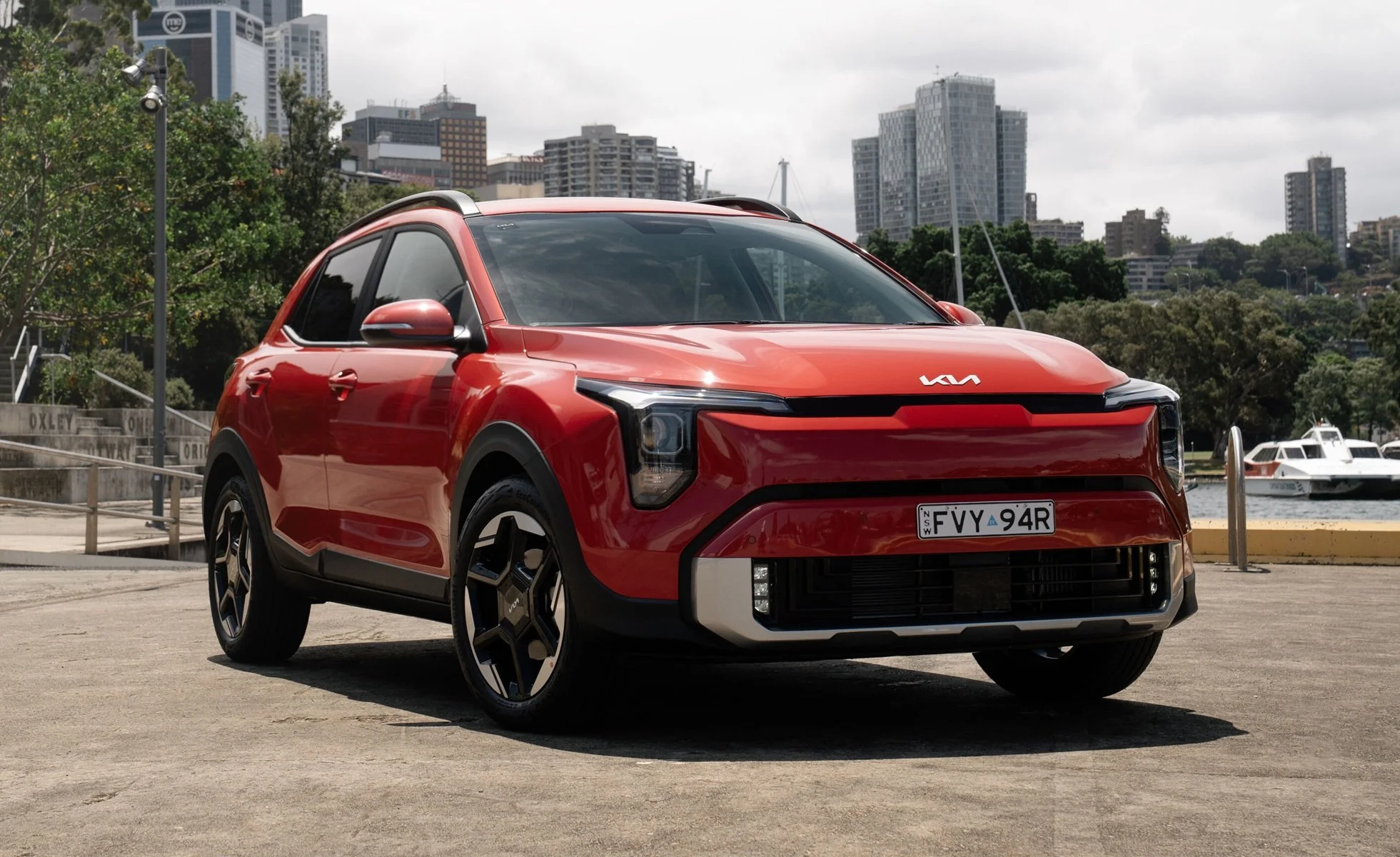Lewis Hamilton loses a race ... with reality
Formula One legend Lewis Hamilton has lost a race with reality - against the statue of a dude who’s been dead for 300 years
Driving ambition
Lewis Hamilton is - by any measure - a driving legend, blessed with incredible skill and on the cusp of F1 immortality in the manner of a Senna or Fangio.
As a driver - Lewis Hamilton is awesome. I would love to hear him talk us all through a lap of Brands Hatch, or the Nurburgring. But - to be perfectly frank - I don’t actually give a shit what he thinks about anything else.
Celebrities often disappoint when they comment outside their specialty. Nobody wants to hear what Kim Kardashian’s arse thinks about relativistic mass.
Stick with me here, because I have to move laterally on the chess-board now.
BRISTOL: Where George Floyd & Lewis Hamilton intersect
Tensions are high around the world following the brutal and wholly unjust death of George Floyd in America. Some would call it a murder, and I would be among them. Ordinary people across the western world increasingly feel both disempowered and betrayed by the system, which is happy to benefit only the rich.
On my world, lives of every colour matter. Equally. There needs to be a level playing field on this. And, pretty clearly, there isn’t.
I understand, therefore, why an angry mob would vandalise the statue of a dude who’s (at best) an historical footnote, in Bristol, in the UK. They ripped it down after 125 years and threw it in the harbour, ignominiously. Just the other day.
Take that, Edward Colston, you bastard. You croaked at the age of 84, roughly 300 years ago, in 1721. And your effigy has been hurled to the bottom of the Avon river. (Although the council did soon thereafter resurrect you, not unlike Jesus…)
Edward Colston - philanthropist & slave trader
Mr Colston was a Tory MP, a merchant, and a philanthropist who built local schools, hospitals, and established charitable foundations in and around Bristol and London - many of which survive to this day. Institutions and buildings bear his name.
You can even chow down a nice, fruity Colston bun in Bristol - so I suppose that’s nice. All this is true and a matter of historical fact. So, why was the crowd so self-evidently pissed?
Colston was a senior executive in a company established by King Charles II - the Royal African Company - which traded gold, silver, ivory and - at this point you best remove the rose coloured tint of retrospectivity - because it also traded slaves, disgracefully. Legally, under the seal of the crown, but disgracefully nonetheless.
84,000 slaves - men, women and children, whose lives mattered to them just as much as yours does to you, and mine certainly does to me. Stolen and sent to the Americas, to work mainly on tobacco and cotton fields. 19,000 of them didn’t even make it. They died in transit. Seafaring was a much more high-risk endeavour back then, clearly. Except of course on the Ruby Princess...
It’s easy to see why an angry mob in 2020, incensed over the current, relatable brutality, would view the Colston statue as a target. Perhaps a monument to ongoing evil. Certainly, emblematic of a problem. And perhaps worthy of crowd-sourced retribution.
A symbolic act. Perhaps it will make the policymakers listen. Maybe it made marginalised protesters feel better. At least nobody got hurt. A statement was made, and a dude who croaked 300 years ago is unlikely to complain too vociferously. (Although I’m certain we’d all listen intently if he did…)
And then, of course, Lewis Hamilton chimed in - when, in my view he should have shut his trap and concentrated on being a champion driver.
“That man's statue should stay in the river just like the 20 thousand African souls who died on the journey here and thrown into the sea, with no burial or memorial. He stole them from their families, country and he must not be celebrated! It should be replaced with a memorial for all those he sold, all those that lost their lives!” - Lewis Hamilton
Clearly, slavery and racism are an indelible scar on the human spirit and we need to eradicate them from the future. I’m not talking about PC bullshit, either. Snowflakes with their feelings all hurt. I’m talking about eliminating future crimes against humanity.
To me, that’s what’s important. And dudes like Lewis Hamilton simply are ill-equipped intellectually to help on this - in my view:
“I challenge government officials worldwide to make these changes and implement the peaceful removal of these racist symbols.” - Lewis Hamilton
These racist symbols indeed. These close ties with slavery. Hear hear. Mr Hamilton is challenging lawmakers peacefully to remove racist symbols indelibly linked to slavery. It seems unequivocal.
And yet, also a poor idea to lob such a stone, no matter how well-intended, when your arse resides in such a seemingly glass house.
Words -vs- conduct
Mr Hamilton reportedly earns roughly 50 million pounds Sterling annually - that’s about $90 million Shitsvillian micro-pesos. Much of his considerable wealth derives from contracts he has had, or has, with Mercedes-Benz and Hugo Boss.
If you do a Google image search of ‘Lewis Hamilton’ it’s quite hard to find images where he is not emblazoned with the coveted three-pronged suppository. It’s how he rolls - they’re joined at the head, usually - and there’s nothing wrong with that.
But if it is fair to stick the boot into Edward Colston and men of his ilk, in the sincere hope of making the world a better place …
...to advocate strenuously, using the full gravitational pull of the A-List Influencer, for the peaceful removal of racist symbols linked indelibly to slavery … if that’s reasonable, is it not the next logical step to identify existing, contemporary symbols worthy of our disdain and advocate for their peaceful removal?
I suggest we give the pyramids in Egypt a pass, owing to the passage of time, but a couple of far more recent slavery-linked contenders come instantly to mind: Mercedes-Benz and Hugo Boss, coincidentally enough.
In my view, every celebrity on Earth should employ a well-read person, specifically to filter out every absurd public comment they intend to make. An editor. To save them from themselves. A ‘no’ man, to balance out all the limpet-like ‘yes’ men in the entourage.
SPONSOR #1: Mercedes-Benz’s links to slavery
Mercedes-Benz is on the record admitting, as far back as 1986, that it used as many as 40,000 slave labourers during World War II. These people worked in atrocious conditions, and Daimler - which owns Mercedes - got rich. Mercedes even built Hitler’s personal car, let’s not forget.
To be balanced on this, the company which later became Audi behaved in a similar way. As did Volkswagen, BMW and Bosch. This was not German industry’s finest hour on human rights, frankly. But it is a matter of historical fact, about which there is no credible debate. And I did not open this door - Lewis Hamilton did. I’m just following him down this hall of peaceful slave-symbol removal.
To be perfectly fair to Mercedes-Benz, the company has policies in place today to eradicate slavery and human trafficking from its supply chain. They implemented these to comply with the UK Modern Slavery Act of 2015. It’s less a ‘contrition’ thing and more a corporate compliance issue - if you want to do business in the UK, and you’re a big enough company.
Mercedes-Benz’s WWII slaves included prisoners of war, abducted civilians and concentration camp detainees. There are chilling historical reports that in 1945, when it seemed losing the war was inevitable, the company attempted to have its slaves rounded up and gassed to prevent them from becoming witnesses for the inevitable prosecutions…
I’m not kidding. I wish I were. But I’m not.
Adolf Eichmann’s post-Nazi career at Mercedes
A high-level Nazi named Adolf Eichmann, who (despite being more or less a quintessentially banal beancounter bureaucrat) was more or less instrumental in the Holocaust used the German Catholic Church to escape to Argentina, after the war ended. There, he was appointed as a senior executive inside a Mercedes-benz factory.
So that was looking good … until the Mossad, an agency I would never cross, given the choice - confronted him with a certain gleam in their eye. He was drugged and ‘renditioned’ to Israel, where he was tried in a bulletproof glass box, over 56 days, then convicted and hanged after a series of unsuccessful appeals, for his war crimes, his crimes against humanity and sundry other atrocious offences of that nature. He claimed, of course, that he was just following orders.
That was in 1962, and Herr Eichmann’s story basically made a mockery of 17 years of Daimler’s post-war bleating and denial about how the company never really supported the Nazis, never used slave labour and was never really onboard, vis-a-vis the Holocaust. These are historical facts. Easily verifiable. You don’t have to like them.
The three-pronged suppository is a symbol indelibly linked to slavery. To dispute this would be to deny the facts. I stress this is not a door I opened.
SPONSOR #2: Hugo Boss & WWII slavery
Hugo Boss now: It wasn’t until 2011 - if memory serves - almost one human lifetime after the war ended - that another key Lewis Hamilton sponsor - Hugo Boss - downplayed and apologised for its treatment of slaves who produced Nazi uniforms in the war. In particular, uniforms for the SS - which were very ‘Marylin Manson’, I think you’d agree.
There’s debate about the size of the Hugo Boss slave workforce, the enthusiasm of the company to support the Nazis, etc. There’s no debate that the company used slaves.
However, it seems pretty clear that Hugo Boss himself - the dude, not the brand - joined the Nazi party in 1931. Member number 508 889, if you’re interested. He appears to have been a sponsoring member of the SS as well. He joined all the related extreme socialism ‘boy bands’ and reportedly cherished a photograph taken of him with Hitler at one of the fuhrer's holiday homes. Mr Boss died in 1948.
Hugo Boss - the brand - survived, obviously, and withdrew from F1 sponsorship in 2018.
Fact -vs- fiction
Mercedes-Benz and Hugo Boss seem to have sidestepped a lot of recent ‘slavery’ backlash. Let’s not forget HBO Max recently pulled the movie ‘Gone With the Wind’ due to its fictional portrayal of slavery. Tarantino is under ongoing fire for his use of the N-word. John Cleese’s hilarious ‘don’t mention the war’ episode of Fawlty Towers was of course yanked by the BBC.
These are, of course, works of fiction. And yet tolerance of them is low. Fiction has become intolerable, seemingly, but organisations such as Hugo Boss and Mercedes-Benz with tangible links to actual slavery get a pass. How, exactly, does that work? What is the secret sauce to evading scrutiny on human rights violations of this profound nature?
Can Lewis Hamilton resolve his words and his commercial conduct?
If I ruled the world I would ask Mr Hamilton how committed he really is to his proposed peaceful removal of these enduring (quote-unquote) “racist symbols” indelibly linked to slavery.
I’d like to know how he feels about all the wealth he’s amassed off the back of companies such as this, and how his recent public statements might not be construed therefore, as being starkly at odds with his conduct and his bank balance.
As I see it, Lewis Hamilton’s power and popularity derives directly from his association with businesses roughly as grubby on the slavery front as the Royal Africa Company from three centuries ago.
How can Lewis Hamilton be properly critical of one and not the others?
If Mr Hamilton is so openly enthusiastic about the removal of a monument to a virtual nobody in the slave game 300 years ago, how does he resolve his relationship with the brands that made him so rich, and their clear links to the same disgraceful line of business just 80 years back?
Why is nobody in the media taking him to task about this?
Finally, I’ll leave you with this: If I were a corporate sponsorship manager, I would include a ‘not to bring the brand into disrepute’ termination clause in any contract. If I were managing such things for Mercedes-Benz I would make a list of topics which were off limits for public comment among those who find themselves fortunately on the sponsorship gravy train.
Slavery would certainly be on the ‘no fly’ list, as would the holocaust, the final solution, extreme socialism, Hitler, and basically all issues that fall under this general rubric. It does only seem prudent.
I’d suggest that while black lives certainly do matter, all slavery is abhorrent, even if the slaves in question were forced into servitude by sponsors, and were not predominately black.























Just because a ute is cheap, that doesn’t mean it’s worth the money. Is the GWM Cannon more than just a cut-price Ranger wannabe? Can it offer towing, off-roading capability and robust design to compete with the big brand dual-cab utes like Hilux and Triton?